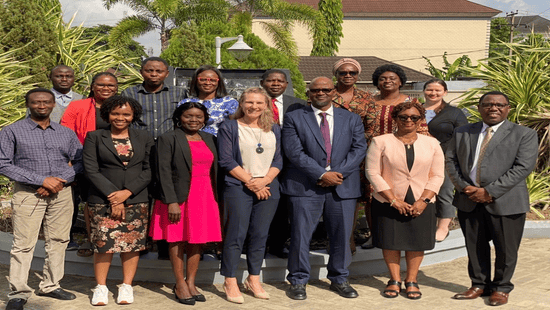Hepatitis B Network Addresses Research Gaps in Sub-Saharan Africa

Improving the health and wellbeing of patients around the world is at the heart of all the work of the Robert J. Havey, MD Institute for Global Health. Havey Institute trainee Theresia Ottaru, MD, MSc, PhD, embodies that work when it comes to adults living with HIV.
Ottaru, an epidemiologist at Muhimbili University for Health and Allied Sciences (MUHAS) in Dar es Salaam, Tanzania, studies health and patient wellbeing among those with HIV, employing implementation science concepts to improve care delivery and health outcomes.
Her doctoral dissertation, ‘Needs, Barriers, and Facilitators to the Integration of Cardiovascular Diseases Care Into HIV Clinics in Tanzania’ was supported by the NIH D43 grant, ‘Building capacity for patient centered outcomes research to improve the quality and impact of HIV Care in Tanzania’ (NIH Fogarty 1D43TW010946) as well as a Havey Institute for Global Health Catalyzer Award, ‘Examining the Prevalence of Cardiovascular Disease Risk Factors and the Cascade of Cardiovascular Disease Care Among Tanzanians Living with HIV.’
As HIV treatment and access to care improve, the affected population’s life expectancy grows. With these improvements, however, come new challenges including increasing rates of age-related comorbidities like cardiovascular disease and related disorders such as hypertension, stroke, and heart failure. Ottaru’s study, which enrolled more than 600 adults with HIV, found more than half of the participants to have ‘less than ideal cardiovascular health.’ More than a third of the participants had evidence of renal dysfunction. Studying this growing population is essential to understanding how to best meet people living with HIV healthcare needs beyond HIV.
“The need to improve our understanding of cardiovascular disease and access to good preventative care among aging adults with HIV is critical for their long-term health and survival,” Ottaru explains.
Ottaru’s doctoral research also explores potential avenues for improvement in the delivery of cardiovascular disease care in HIV populations in Tanzania, such as the integration of cardiovascular disease services within HIV clinics through qualitative interviews with people living with HIV and HIV providers. Although patients and providers report a high demand and acceptance for integrated care, they also identify significant barriers to integration, such as high costs of medication, lack of specialists, and poor patient and provider education.
With such important obstacles, Ottaru’s research is needed now more than ever.
The need to improve our understanding of cardiovascular disease and access to good preventative care among aging adults with HIV is critical for their long-term health and survival.”
- Theresia Ottaru, MD, MSc, PhD, epidemiologist at Muhimbili University of Health and Allied Sciences (MUHAS) & Havey Institute for Global Health trainee
To learn more about the Center for Global Cardiovascular Health, visit their website.
For details on events, news, and funding opportunities, sign up for the Havey Institute for Global Health newsletter.

